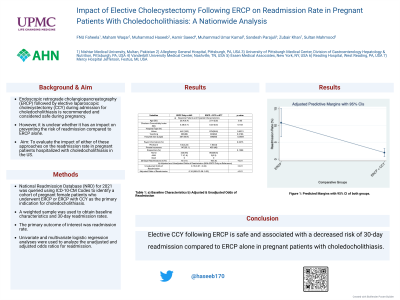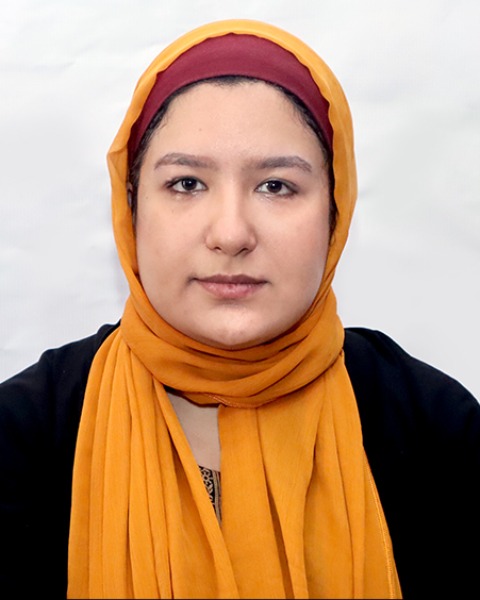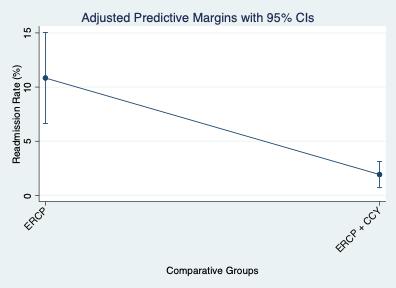Tuesday Poster Session
Category: Biliary/Pancreas
P3439 - Impact of Elective Cholecystectomy Following ERCP on Readmission Rate in Pregnant Patients With Choledocholithiasis: A Nationwide Analysis
Tuesday, October 29, 2024
10:30 AM - 4:00 PM ET
Location: Exhibit Hall E

Has Audio

Fnu Faheela, MBBS
Nishtar Medical University
Multan, Punjab, Pakistan
Presenting Author(s)
Award: Presidential Poster Award
Fnu Faheela, MBBS1, Maham Waqar, MD2, Muhammad Haseeb, MD, MSc3, Aamir Saeed, MD4, Muhammad Kamal, MD5, Sandesh Parajuli, MD6, Zubair Khan, MD7, Sultan Mahmood, MD8
1Nishtar Medical University, Multan, Punjab, Pakistan; 2Allegheny General Hospital, Pittsburgh, PA; 3University of Pittsburgh Medical Center, Pittsburgh, PA; 4Vanderbilt University Medical Center, Nashville, TN; 5Hackensack Meridian Health, Roselle Park, NJ; 6Reading Hospital - Tower Health, Reading, PA; 7Mercy Hospital Jefferson, Festus, MO; 8University of Pittsburgh Medical Center, Wexford, PA
Introduction: Endoscopic retrograde cholangiopancreatography (ERCP) followed by elective laparoscopic cholecystectomy (CCY) during admission for choledocholithiasis is recommended and considered safe during pregnancy to provide definitive treatment and reduce the risk of recurrent biliary events. However, it is unclear whether it has an impact on preventing the risk of readmission compared to ERCP alone. Our study aimed to evaluate the impact of either of these approaches on the readmission rate in pregnant patients hospitalized with choledocholithiasis in the US.
Methods: The National Readmission Database (NRD) for 2021 was queried using ICD-10-CM Codes to identify a cohort of pregnant female patients who underwent ERCP or ERCP with CCY as the primary indication for choledocholithiasis. A weighted sample was used to obtain baseline characteristics and 30-day readmission rates. Univariate and multivariate logistic regression analyses were used to analyze the unadjusted and adjusted odds ratios for readmission
Results: Among the 1419 pregnant patients admitted with choledocholithiasis, 442 (31.1%) underwent ERCP only, compared to 977(68.9%) who underwent elective CCY following ERCP during the same admission. Baseline characteristics, including age and comorbidities, were comparable between the two groups. Our cohort was broadly admitted to a large urban teaching hospital. Compared to patients with only ERCP, there was a larger proportion of patients with private insurance who underwent CCY during the same admission period (35% vs. 48%). The 30-day all-cause readmission rate was higher in the ERCP group than in the ERCP and Cholecystectomy groups (11% vs. 1.8%). The adjusted Odds of readmission for ERCP and Cholecystectomy group were 0.16 times lower (95% CI 0.16 – 0.33) than those with only ERCP. The top five diagnoses for readmission did not include any diagnoses related to postsurgical complications.
Discussion: Our study shows that elective CCY following ERCP is safe and associated with a decreased risk of 30-day readmission compared to ERCP alone in pregnant patients for choledocholithiasis.

Note: The table for this abstract can be viewed in the ePoster Gallery section of the ACG 2024 ePoster Site or in The American Journal of Gastroenterology's abstract supplement issue, both of which will be available starting October 27, 2024.
Disclosures:
Fnu Faheela, MBBS1, Maham Waqar, MD2, Muhammad Haseeb, MD, MSc3, Aamir Saeed, MD4, Muhammad Kamal, MD5, Sandesh Parajuli, MD6, Zubair Khan, MD7, Sultan Mahmood, MD8. P3439 - Impact of Elective Cholecystectomy Following ERCP on Readmission Rate in Pregnant Patients With Choledocholithiasis: A Nationwide Analysis, ACG 2024 Annual Scientific Meeting Abstracts. Philadelphia, PA: American College of Gastroenterology.
Fnu Faheela, MBBS1, Maham Waqar, MD2, Muhammad Haseeb, MD, MSc3, Aamir Saeed, MD4, Muhammad Kamal, MD5, Sandesh Parajuli, MD6, Zubair Khan, MD7, Sultan Mahmood, MD8
1Nishtar Medical University, Multan, Punjab, Pakistan; 2Allegheny General Hospital, Pittsburgh, PA; 3University of Pittsburgh Medical Center, Pittsburgh, PA; 4Vanderbilt University Medical Center, Nashville, TN; 5Hackensack Meridian Health, Roselle Park, NJ; 6Reading Hospital - Tower Health, Reading, PA; 7Mercy Hospital Jefferson, Festus, MO; 8University of Pittsburgh Medical Center, Wexford, PA
Introduction: Endoscopic retrograde cholangiopancreatography (ERCP) followed by elective laparoscopic cholecystectomy (CCY) during admission for choledocholithiasis is recommended and considered safe during pregnancy to provide definitive treatment and reduce the risk of recurrent biliary events. However, it is unclear whether it has an impact on preventing the risk of readmission compared to ERCP alone. Our study aimed to evaluate the impact of either of these approaches on the readmission rate in pregnant patients hospitalized with choledocholithiasis in the US.
Methods: The National Readmission Database (NRD) for 2021 was queried using ICD-10-CM Codes to identify a cohort of pregnant female patients who underwent ERCP or ERCP with CCY as the primary indication for choledocholithiasis. A weighted sample was used to obtain baseline characteristics and 30-day readmission rates. Univariate and multivariate logistic regression analyses were used to analyze the unadjusted and adjusted odds ratios for readmission
Results: Among the 1419 pregnant patients admitted with choledocholithiasis, 442 (31.1%) underwent ERCP only, compared to 977(68.9%) who underwent elective CCY following ERCP during the same admission. Baseline characteristics, including age and comorbidities, were comparable between the two groups. Our cohort was broadly admitted to a large urban teaching hospital. Compared to patients with only ERCP, there was a larger proportion of patients with private insurance who underwent CCY during the same admission period (35% vs. 48%). The 30-day all-cause readmission rate was higher in the ERCP group than in the ERCP and Cholecystectomy groups (11% vs. 1.8%). The adjusted Odds of readmission for ERCP and Cholecystectomy group were 0.16 times lower (95% CI 0.16 – 0.33) than those with only ERCP. The top five diagnoses for readmission did not include any diagnoses related to postsurgical complications.
Discussion: Our study shows that elective CCY following ERCP is safe and associated with a decreased risk of 30-day readmission compared to ERCP alone in pregnant patients for choledocholithiasis.

Figure: NRD-ERCP-Predictive margins
Note: The table for this abstract can be viewed in the ePoster Gallery section of the ACG 2024 ePoster Site or in The American Journal of Gastroenterology's abstract supplement issue, both of which will be available starting October 27, 2024.
Disclosures:
Fnu Faheela indicated no relevant financial relationships.
Maham Waqar indicated no relevant financial relationships.
Muhammad Haseeb indicated no relevant financial relationships.
Aamir Saeed indicated no relevant financial relationships.
Muhammad Kamal indicated no relevant financial relationships.
Sandesh Parajuli indicated no relevant financial relationships.
Zubair Khan indicated no relevant financial relationships.
Sultan Mahmood indicated no relevant financial relationships.
Fnu Faheela, MBBS1, Maham Waqar, MD2, Muhammad Haseeb, MD, MSc3, Aamir Saeed, MD4, Muhammad Kamal, MD5, Sandesh Parajuli, MD6, Zubair Khan, MD7, Sultan Mahmood, MD8. P3439 - Impact of Elective Cholecystectomy Following ERCP on Readmission Rate in Pregnant Patients With Choledocholithiasis: A Nationwide Analysis, ACG 2024 Annual Scientific Meeting Abstracts. Philadelphia, PA: American College of Gastroenterology.

